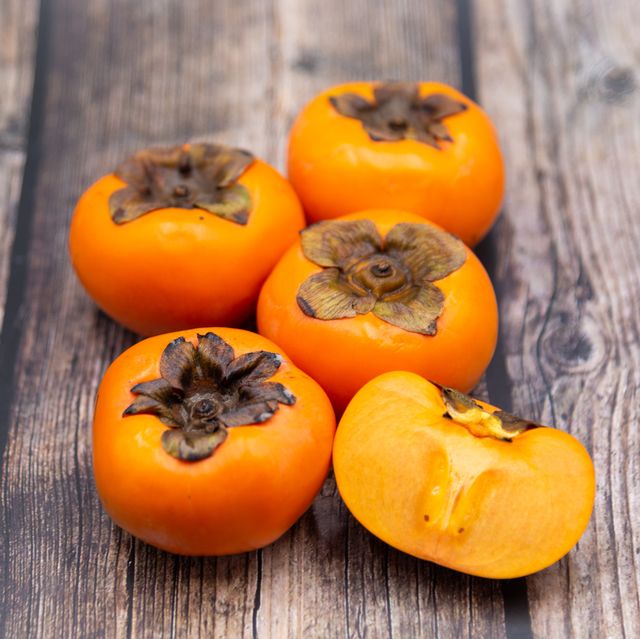Pomegranates and açaí might get more attention as fruity superfoods, but another piece of produce you should add to your cart: persimmons.
Mildly sweet and becoming more available across the U.S. (particularly during their season of September to December), these orange fruits are full of nutrition. In fact, the health benefits of persimmons make them an ideal ingredient for a cyclist’s diet.
What are persimmons?
Picture an orange-tinted tomato—that’s pretty much what you’re looking for when you’re seeking out fresh persimmons. Some varieties are heart-shaped, while others are more pumpkin-shaped. Either way, they range in size from about ¾ inch to 3 ½ inches.
A tree fruit native to Japan and China, they’re now growing stateside: California alone grew and harvested more than 30 million pounds of persimmons in 2019, according to the National Agricultural Statistics Service.
While there are hundreds of types of persimmons grown across the globe, “in the U.S., there are two types of commercial persimmons widely available: Fuyus and Hachiyas,” explains Katherine Brooking, R.D., co-founder of the nutrition news company Appetite for Health in San Francisco. “Fuyus (otherwise known as sweet persimmons, native persimmons or American persimmons) are moderately sweet, with a firm flesh. Fuyus are okay to eat when they’re still quite firm, like an apple,” Brooking explains. “Hachiyas (also known as Japanese persimmons, bitter persimmons, or astringent persimmons) should only be eaten once they’re fully ripe.”
Persimmons taste a little like honey, and their texture is reminiscent of an apricot. Just like peaches and apples, both the peel and the flesh are edible.
So why don’t we see them as prominently within the produce compartment as bananas or apples? The main reason is that they have a short season. As mentioned, fresh persimmons are available from fall to early winter.
When you stock up, seek out persimmons that are bright, glossy, free from blemishes, and plump without being overly firm. Non-astringent Fuyus are good to eat any time you desire. Allow astringent Hachiyas to ripen until you can easily pull off the green leaves and until the fruit feels soft to the touch.
What nutrients will you get from persimmons?
“Persimmons are nutrient-packed and offer micronutrients that make them especially great for athletes,” Brooking says.
Here’s persimmon nutrition information for one 2 ½-inch (168-gram) Hachiya (Japanese persimmon), according to the USDA:
- 118 calories
- 1 g protein
- 0.5 g total fat
- 31 g carbohydrates
- 6 g fiber
- Vitamin A: 55% of the RDI (recommended daily intake)
- Vitamin C: 22% of the RDI
- Vitamin B6 (pyridoxine): 8% of the RDI
- Potassium: 8% of the RDI
- Copper: 9% of the RDI
- Manganese: 30% of the RDI
“Athletes need carbohydrate-rich foods to provide their body with energy, as carbs are the preferred source of fuel for physical activity,” explains Roxana Ehsani, R.D., C.S.S.D., a registered dietitian nutritionist in Las Vegas, Nevada and a national media spokesperson for the Academy of Nutrition and Dietetics. “Most athletes who train regularly aren’t eating enough carb-rich foods, and may be running low on glycogen, the stored form of glucose which can impact performance.”
Snack on one about 30-minutes prior to your training session, or even enjoy one or two throughout a longer ride if you’re out for a few hours at a time, Ehsani suggests.
What are the health benefits of persimmons?
Beyond being a stellar source of carbs, persimmons pack other nutrients and health-boosting benefits that make them worthy of a spot on your plate.
1. Persimmons might help prevent cramps
With 270 milligrams of potassium per fruit, about as much as two-thirds of a banana, persimmons are a wise pick for any athlete, Ehsani confirms. “Potassium is an important electrolyte needed by everyone daily, but is especially critical for an athlete’s performance. Low intake of potassium may cause muscle cramping,” she says. It also promotes heart health and bone strength.
2. They’re a heart-healthy food
One persimmon delivers 6 grams of fiber, a healthy type of carbohydrate that’s been linked to lower risk for heart disease. (Women should aim for 25 grams per day; men 35 grams.) The potassium in persimmons may also help reduce blood pressure. Plus, adequate consumption of folate and vitamin C have been proven to lower the risk for strokes and persimmon pack both of those vitamins, too.
3. They protect your vision
Persimmons are very high in lutein and zeaxanthin, two forms of beta carotene that support eye health. These antioxidants act as a first line of defense to fend off vision loss related to age-related macular degeneration.
4. Persimmons help support your immune system
“Persimmons are a good source of vitamin C and vitamin A, two antioxidants that help reduce the risk of many diseases,” Ehsani says. These antioxidants fight free radicals and help tame inflammation.
Due to the wear and tear of long training sessions, “endurance athletes tend to be more susceptible to upper respiratory infections than the average person. Consuming a good source of vitamin C-rich fruits and veggies, like persimmons, is one way to combat infections,” Ehsani adds.
While no diet can prevent an infection, it can help bolster the body’s defenses to combat any foreign invaders before they cause a full-blown illness. “Consuming vitamin C-rich foods can help aid the absorption of iron-rich foods, too.” (Iron is a VIP mineral for female athletes in particular.)
10 ways to add persimmons to your diet
In addition to fresh persimmons, you can find dried persimmons online and at select supermarkets year round. When fresh persimmons are in season, it’s tough to beat their fresh flavor as a preride snack or in one of these tasty persimmons recipe ideas:
- Slice and toss into salads
- Dice and fold into oatmeal or yogurt
- Wedge and add to a charcuterie board instead of, or alongside, grapes or apples
- Blend into smoothies
- Roast, then top with plain Greek yogurt and a drizzle of honey for dessert
- Slice and dehydrate into DIY fruit snacks
- Wedge and bake as part of a sheet pan supper alongside chicken and onions for a sweet-and-savory entree
- Slice and toss with citrus slices and pomegranate seeds for a superfood fruit salad
- Slice and broil, then stack on top of goat cheese-slathered baguette slices
- Dice, place on top of a wheel of Brie, drizzle with honey then bake until the fruit is golden brown and cheese is melty
The bottom line on the benefits of persimmons
In addition to being versatile and a nice break from the usual apple, orange, or banana, “persimmons offer up a wealth of nutrition,” Ehsani says. So the next time you see them at the grocery store, stock up. Your body and your taste buds will thank you.

Karla Walsh is a Des Moines, Iowa-based freelance writer, editor, freelance writing coach and level one sommelier who balances her love of food and drink with her passion for fitness (or tries to, at least!). She has over 15 years of professional experience covering food, wine, travel, nutrition, health, fitness, psychology, beauty, relationships and beyond.













